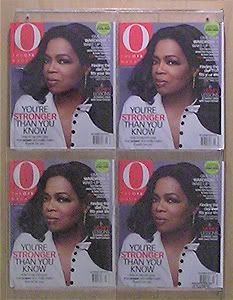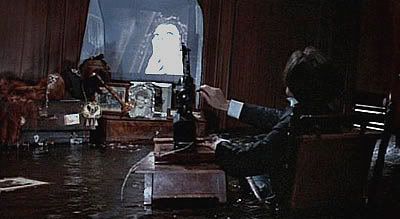Throws a big bash in her honorCriss Angel, the Mindfreak illusionistOprah hosted a block party to send off her 24th season in her hometown of Chicago. She closed off a whole street and opened up her bash for the public. Her crew worked 24/7 to pull off the spectacle of a "flash mob" with hundreds of people dancing in unison to a song by that multi-culti group the Black Eyed Peas.
Did Oprah dance? Well, yes. But she mostly jumped up and down in her chirpy yellow sweat shirt/black pants combo, her ponytail bopping like a young girl's. Oprah is embracing her body, like she tells everyone else to do, because that is the only explanation for her unflattering get up. This leaves us wondering when she'll start one of her weight loss programs again.
Jennifer Hudson, another Chicagoite, came on to sing "I'm every woman" which Oprah mouthed the words to. Hudson later talked to Oprah about her new baby. This every woman, this every Oprah woman, the representative of Chicago, is actually a single mom, with a "fiancé" conveniently standing by. Don't hold your breath for a wedding, and if that, for a long marriage. Single motherhood is after all second only to sainthood.
Oprah has to think of her audience, which is mostly middle class, and middle America. So she brought in James Taylor who sang his ballad "How sweet it is to be loved by you," as Oprah shouts out to the crowd "Chicago!" Of course, everything revolves around Oprah, everyone loves Oprah, especially this 20,000 strong crowd. And there were the hip (not hop) Rascal Flatts who cover a lot of ground with their country rock pop style.
Oprah has to bring in the magic, the angels, the mysticism. After all, she is a great proponent of the spiritual movement The Secret. Magician Criss Angel (not a real angel) did the trick for her, by channelling his Mindfreak TV act to make random word guesses.
So, why Chicago, and why this huge block party on the 24th season and not the 25th silver anniversary? My own, non-mindfreak, guess is that this is "The year of the Chicago." Barack is from Chicago after all, and Oprah alienated her loyal female followers when she openly campaigned for him. But, everything is always about Oprah first. With Barack successfully in the White House, Chicago still belongs to Oprah, who is the most powerful every woman in America.













